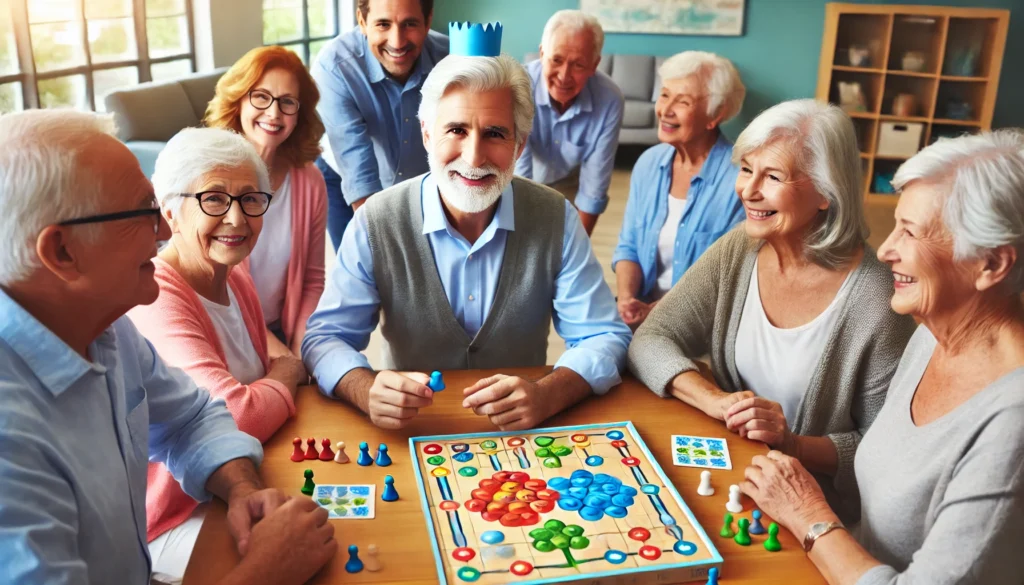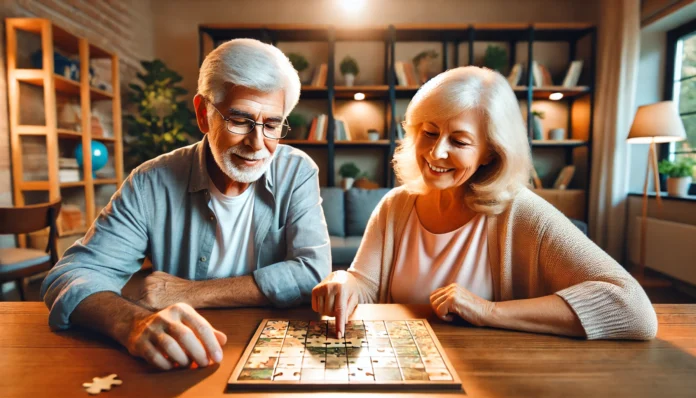Introduction
As we age, cognitive health becomes an essential aspect of overall well-being. The ability to remember, reason, and process information can gradually decline, but engaging in targeted activities can help mitigate these effects. Brain play for seniors has gained popularity due to its effectiveness in promoting mental agility. Research has shown that memory games for seniors and brain training for elderly individuals can improve recall, attention, and problem-solving skills. The question many older adults ask is: How can one keep their brain active and resilient? The answer lies in incorporating a variety of engaging cognitive exercises into daily routines.
You may also like: Stay Mentally Sharp in Your 70s: How to Turn Your Aging Brain Around with Science-Backed Strategies
The Science Behind Brain Games and Cognitive Health
The brain is like a muscle; the more it is used, the stronger it remains. Neuroscientific studies have demonstrated that brain exercises for memory in the elderly can stimulate neuroplasticity, the brain’s ability to reorganize itself by forming new neural connections. This is crucial for maintaining cognitive functions as we age. Free brain games for seniors provide accessible ways to challenge different regions of the brain, enhancing memory retention and cognitive flexibility. Additionally, engaging in brain training exercises for seniors can contribute to reducing the risk of neurodegenerative conditions like dementia and Alzheimer’s disease.
Memory Games for Seniors: Strengthening Recall and Retention
Memory games for seniors are specifically designed to improve retention and recall. Engaging in these exercises can help individuals remember names, locations, and daily activities more efficiently. Some effective memory games for elderly individuals include:
- Matching Games – These involve pairing related objects, images, or words. Matching exercises stimulate the hippocampus, the part of the brain responsible for memory formation.
- Storytelling Recall – Retelling a story or summarizing a book or movie helps improve sequential memory and comprehension.
- Word Association Games – Associating new information with familiar words strengthens neural connections and makes recall easier.
- Card Games – Playing games like bridge or solitaire requires concentration and strategic thinking, which helps enhance cognitive functions.
- Memory Journeys – Using mental imagery techniques to associate facts with visual locations in a house or known environment reinforces recall.

The Role of Brain Training for Seniors in Cognitive Preservation
Brain training for seniors is not limited to games; it extends to a wide range of structured cognitive challenges that engage various aspects of thinking. Brain training exercises for the elderly should incorporate activities that focus on critical thinking, language, and numerical skills. Examples of these include:
- Sudoku and Crossword Puzzles – These classic activities promote problem-solving and pattern recognition.
- Chess and Strategy-Based Games – Engaging in strategic thinking exercises improves cognitive flexibility and planning abilities.
- Speed Processing Tasks – Activities that require quick responses, such as reaction time tests, help maintain mental sharpness.
- Language Learning – Picking up a new language challenges multiple brain regions and strengthens cognitive resilience.
- Mathematical Reasoning Challenges – Solving number-based puzzles enhances logical thinking and memory retention.
Free Brain Games for Seniors: Accessible Cognitive Enhancement
Many seniors seek free brain games for seniors that can be easily incorporated into their daily routines. Digital platforms and apps provide excellent resources for cognitive exercises. Some notable free mind games for elderly individuals include:
- Lumosity – A well-known app that offers a variety of cognitive tasks tailored to different skill levels.
- BrainHQ – Provides scientifically designed exercises to enhance mental agility.
- Memory Lane – A game-based platform that improves recall through engaging exercises.
- Sudoku and Online Crossword Puzzles – Available for free on numerous websites, these games help sharpen memory and logic.
- Classic Board Games – Chess, Scrabble, and other traditional board games available online promote brain fitness for seniors.
Mind Exercises for Elderly: Strengthening Mental Flexibility
Mind exercises for elderly individuals are designed to keep different aspects of cognition active. These exercises often involve real-life applications that challenge the brain while being enjoyable. Some effective mind games for seniors include:
- Visual-Spatial Exercises – Activities like jigsaw puzzles and mazes improve spatial reasoning and visual perception.
- Musical Training – Learning an instrument or practicing rhythm exercises enhances cognitive processing speed.
- Social Interaction Games – Participating in trivia contests or group discussions stimulates communication skills and knowledge retention.
- Physical Activity Integration – Combining movement with mental tasks, such as dance routines that require memorization, strengthens both brain and body coordination.
- Creative Writing and Journaling – Expressing thoughts through writing fosters memory recall and linguistic fluency.

Cognitive Exercises for Seniors: A Lifelong Approach to Mental Wellness
Cognitive exercises for seniors should be viewed as a lifelong habit rather than a temporary fix. To maintain brain agility, it is important to regularly engage in diverse activities that challenge different cognitive skills. Research has demonstrated that consistency in brain training exercises for seniors leads to long-term benefits in mental clarity and problem-solving abilities. Additionally, incorporating physical exercise, a nutritious diet, and social engagement further complements cognitive training, resulting in a holistic approach to aging well.
Frequently Asked Questions (FAQ)
1. What are the benefits of brain games for seniors?
Brain games for seniors offer numerous cognitive benefits, including improved memory, problem-solving skills, and mental agility. Engaging in memory games for elderly individuals helps maintain neuroplasticity, allowing the brain to form new connections even later in life. Regular participation in cognitive exercises for seniors can delay cognitive decline and enhance overall brain health. Additionally, free brain games for seniors can be a social activity, promoting interaction and reducing feelings of isolation. Brain training exercises for seniors have also been linked to better emotional well-being, as they provide a sense of accomplishment and keep the mind engaged.
2. How often should seniors play brain games?
It is recommended that seniors engage in brain play for seniors at least three to five times a week for optimal benefits. Consistency is key when it comes to cognitive games for seniors, as regular stimulation strengthens neural connections. Playing brain games for older adults for just 20 to 30 minutes per session can lead to noticeable improvements in cognitive function. A balanced routine that includes different types of brain exercises for seniors, such as puzzles, logic challenges, and memory exercises, can provide the best results. Even incorporating free memory games for seniors into daily activities can be beneficial in maintaining cognitive sharpness.
3. What are some of the best free brain games for seniors?
There are many free brain games for seniors available online and through mobile applications that can help improve cognitive function. Crossword puzzles and Sudoku are excellent brain training exercises for seniors that challenge problem-solving and memory recall. Online platforms also offer interactive memory games for elderly individuals that adapt to their cognitive levels. Classic card games such as Solitaire and Bridge also provide strategic thinking opportunities. Additionally, apps designed specifically for brain training for elderly users offer personalized exercises to target different aspects of cognitive health.
4. Do memory games for seniors really help with cognitive decline?
Yes, memory games for seniors have been scientifically proven to support cognitive function and slow down mental decline. Engaging in regular cognitive exercises for seniors can strengthen short-term and long-term memory retention. Brain training for seniors can also improve attention span, decision-making skills, and problem-solving abilities. Research has shown that structured brain training exercises for the elderly can delay symptoms of conditions such as dementia and Alzheimer’s disease. Even simple activities such as free mind games for elderly individuals can provide significant benefits in maintaining an active and healthy brain.
5. Are there any physical activities that enhance the effects of brain training for seniors?
Physical exercise complements brain fitness for seniors by improving blood flow to the brain, which enhances cognitive performance. Activities such as yoga, walking, and tai chi help improve focus, coordination, and mental clarity. Combining movement with brain games for elderly individuals, such as dancing to memorize steps or practicing hand-eye coordination exercises, enhances cognitive benefits. Studies suggest that engaging in both physical and cognitive exercises for seniors can lead to better brain health outcomes. This holistic approach ensures that seniors maintain both mental and physical well-being as they age.
6. What are the best memory exercises for seniors?
Some of the best memory exercises for seniors include recalling past events, storytelling, and learning new skills. Engaging in cognitive games for elderly individuals, such as pattern recognition or word association games, can boost memory recall. Repetition and reinforcement, such as practicing a new language or memorizing a poem, are effective techniques used in brain training exercises for the elderly. Technology-based games like digital memory apps offer interactive ways to engage the brain. Mind exercises for elderly individuals that challenge different aspects of cognition, such as logic puzzles and strategy-based games, can further enhance memory retention.
7. Can social activities be considered brain exercises for memory elderly individuals?
Yes, social engagement plays a crucial role in brain health and is an effective form of brain training for seniors. Activities such as group discussions, playing board games, and participating in book clubs stimulate cognitive functions. Engaging in free memory games for seniors with friends or family provides an additional layer of mental challenge through social interaction. Seniors who maintain an active social life tend to experience lower rates of cognitive decline compared to those who are socially isolated. Therefore, incorporating social elements into cognitive exercises for seniors enhances the overall effectiveness of brain training.
8. How do brain training exercises for the elderly improve daily life?
Brain training exercises for the elderly help improve daily life by enhancing memory, focus, and problem-solving skills. Seniors who regularly engage in brain games for older adults tend to have better recall abilities, making everyday tasks such as remembering appointments or locating misplaced items easier. Improved cognitive function also leads to greater independence, as seniors feel more confident in managing finances, cooking, and planning activities. Free mind games for elderly individuals can also increase reaction time, which is important for driving and decision-making. Overall, a strong cognitive foundation contributes to an improved quality of life and mental well-being.
9. What types of brain games are best suited for seniors with mild cognitive impairment?
For seniors with mild cognitive impairment, gentle and engaging cognitive games for seniors are most effective. Matching games, visual puzzles, and guided memory exercises are excellent options. Brain exercises for seniors that involve storytelling or sequencing tasks help reinforce memory and reasoning skills. Free memory games for seniors with simplified instructions and adaptive difficulty levels can ensure a comfortable and enjoyable experience. Caregivers and family members can assist by engaging in brain training for elderly loved ones, making it a shared and supportive activity.
10. Can diet and lifestyle choices enhance the effects of brain fitness for seniors?
Yes, diet and lifestyle choices significantly impact brain fitness for seniors. A diet rich in antioxidants, omega-3 fatty acids, and essential vitamins supports cognitive function and memory retention. Foods such as blueberries, walnuts, and salmon are known to aid brain health and complement memory exercises for seniors. Additionally, maintaining a consistent sleep schedule, staying hydrated, and managing stress all contribute to better cognitive performance. Pairing these lifestyle habits with regular brain games for elderly individuals ensures a well-rounded approach to maintaining mental acuity. A holistic combination of diet, exercise, and cognitive stimulation leads to long-term brain health.

Conclusion: Sustaining Cognitive Health Through Brain Training for Elderly Individuals
Maintaining cognitive health in old age is possible through a combination of brain play for seniors, memory games for elderly individuals, and structured brain training exercises for seniors. By incorporating a variety of stimulating activities into daily routines, older adults can enhance memory, increase mental flexibility, and sustain cognitive function well into their later years. Free memory games for seniors, along with social engagement and healthy lifestyle choices, serve as powerful tools for cognitive preservation. As research continues to shed light on the benefits of brain training for elderly individuals, the importance of proactive cognitive engagement remains clear. Through dedication and consistency, seniors can continue to thrive mentally, enjoying rich and fulfilling lives with sharper minds and stronger memories.
mental exercises for seniors, cognitive stimulation activities, senior brain health tips, memory improvement techniques, elderly brain training, activities to boost memory, cognitive fitness for seniors, best puzzles for elderly, memory boosting foods, strategies to prevent memory loss, mental agility exercises, how to keep the brain sharp, mind stimulation for seniors, senior cognitive wellness, fun memory games for seniors, ways to enhance brain function, keeping the mind active in old age, simple brain workouts for elderly, boosting cognitive health naturally, senior mental sharpness strategies
Further Reading:
22 brain exercises to improve memory, cognition, and creativity
10 Brain Games and Other Activities That Boost Memory
10 Best Brain Games for Seniors
Disclaimer
The information contained in this article is provided for general informational purposes only and is not intended to serve as medical, legal, or professional advice. While Health11News strives to present accurate, up-to-date, and reliable content, no warranty or guarantee, expressed or implied, is made regarding the completeness, accuracy, or adequacy of the information provided. Readers are strongly advised to seek the guidance of a qualified healthcare provider or other relevant professionals before acting on any information contained in this article. Health11News, its authors, editors, and contributors expressly disclaim any liability for any damages, losses, or consequences arising directly or indirectly from the use, interpretation, or reliance on any information presented herein. The views and opinions expressed in this article are those of the author(s) and do not necessarily reflect the official policies or positions of Health11News.


